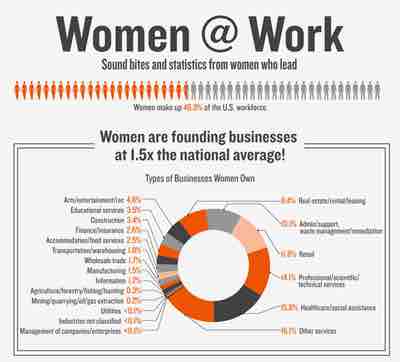Entrepreneurs are catalysts for economic change. Researchers suggest that entrepreneurs are highly creative individuals with a tendency to imagine new solutions by finding opportunities for profit or reward. The ability of entrepreneurs to innovate is thought to relate to innate traits such as extroversion and a proclivity for risk-taking.
Demographics of Entrepreneurs
Enabling Factors
There are entrepreneurs in all demographics and walks of life. There have never been lower barriers to entry when starting a new company. Thanks to developments in technology, there is less capital required than ever before to start a business (depending on the industry). Moreover, advancements in engineering have allowed people to build software and internet businesses from scratch with minimal obstacles.
The venture capital sector has risen from nothing 40 years ago to investing billions in new businesses today. Technology has allowed for business to be scalable over a variety of countries and continents. Previously, scaling a new business would have taken extensive time, focus, and capital. Now, there is infrastructure in place, such as the Internet, FedEx and UPS, and smartphones, which allow entrepreneurs to build a business that can be replicated in different cities globally.
Couple this with slow economic growth due to the banking collapse in the U.S., and a high degree of the over-educated and underemployed, a great deal of people are drawn to entrepreneurship as a way of creating their future.
Youth
All of these factors contribute to the trend of younger and younger business owners. The tendency of young people to take risks, coupled with the relative ease of starting a business in today's environment, has driven down the average age of entrepreneurs. Also - the younger generations (i.e. recently graduates) are facing high degrees of underemployment as a result of economic factors. The younger entrepreneurs also have an interest and familiarity with technology that provides some advantage to innovating with those fields.
Organizations have even risen to service the ever-younger sector entrepreneurs. The Young Entrepreneur Council (YEC) is an American non-profit organization that provides entrepreneurs with access to tools, mentor-ship, and resources that support each stage of their business's development and growth. The organization has several hundred members, all successful young entrepreneurs and business owners, ages 17 to 40—a group that includes the founders and leaders of LivingSocial, Airbnb, Reddit, College Hunks Hauling Junk, Mint.com, myYearbook, Thrillist, Yodle, Threadless, ModCloth, Grasshopper, Likeable, HootSuite, and Blip.tv.
Trends and Statistics for Women in Business
There are exciting things happening inside the world of female entrepreneurship. Women are now a dominant force in small business ownership, and succeeding in industries that were once taboo for women . Women are not only starting businesses, they are staying in business. Between 1997 and 2006, female-owned businesses grew at nearly twice the rate of all U.S. firms (42.3 percent vs. 23.3 percent). During this same time period, employment among female-owned firms grew 0.4 percent, and annual sales grew 4.4 percent. In 2006, reports on women-owned (or majority owned by women) businesses in the United States returned the following impressive statistics.
- There were an estimated 10.4 million privately-held firms;
- These firms accounted for two in five (40.2 percent) of all businesses in the country;
- These firms generated $1.9 trillion in annual sales and employed 12.8 million people nationwide.

Female Entrepreneurship
Recent years have seen a dramatic rise in the number of businesses owned by female entrepreneurs. As the image shows, women are now founding businesses at a rate 1.5 times the national average; the most prevalent such businesses include healthcare / social assistance (15.8%) and professional / technical services (14.1%).